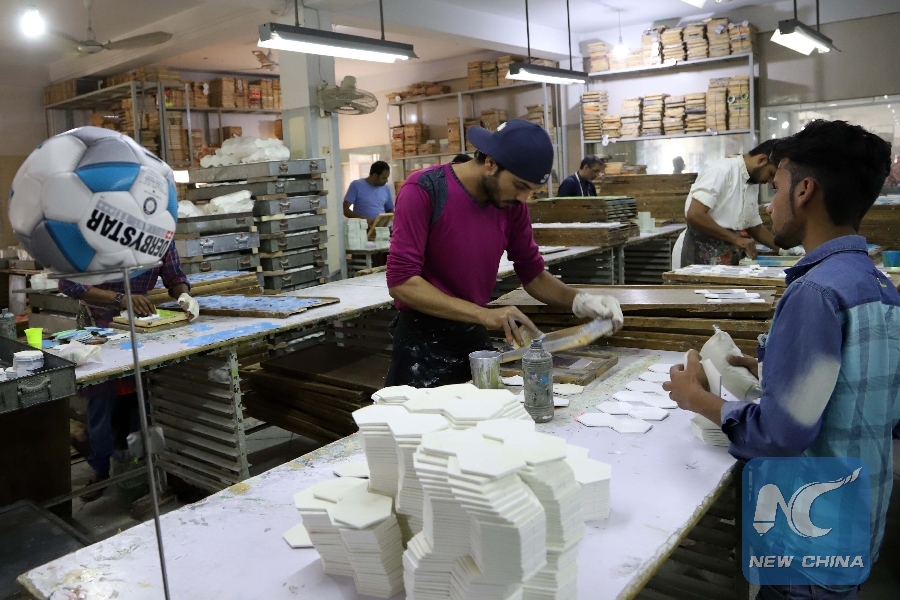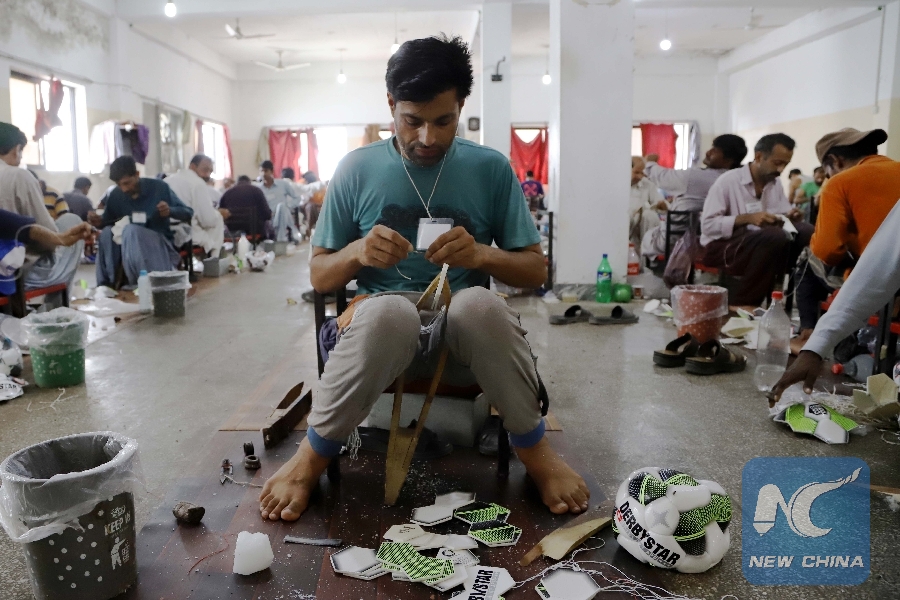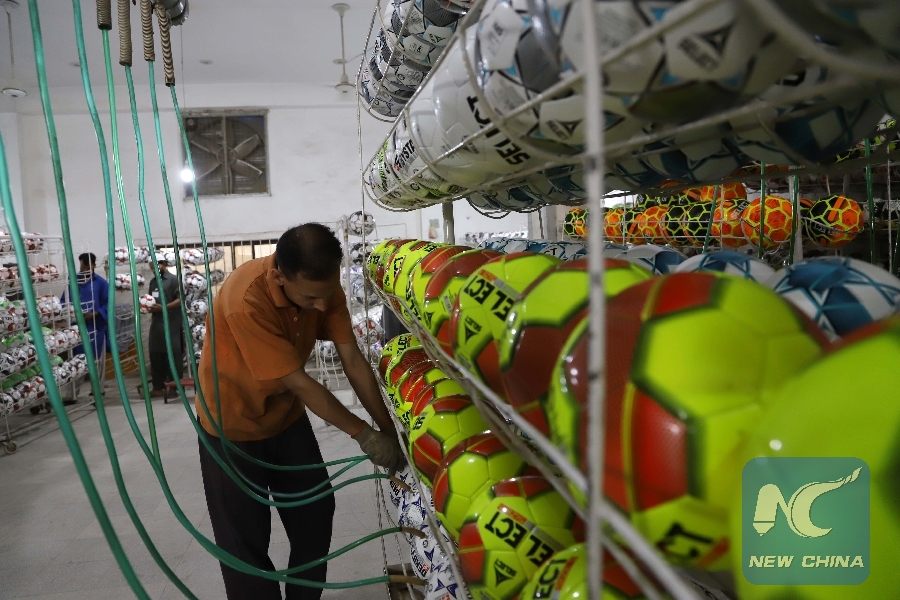
Photo taken on April 12, 2019 shows workers dyeing football strips at a football factory in eastern Pakistan's Sialkot. (Xinhua/Ahmad Kamal)
by Raheela Nazir
ISLAMABAD, May 1 (Xinhua) -- Sialkot, a city in Pakistan's Punjab province, is a center of hand-sewn football making in the world and in its time of glory, the city was once catering to more than 75 percent of total global demand of football.
Sialkot's sharing in the world market now is sliding down to 35 to 40 percent over the past few years, President of Sialkot Chamber of Commerce and Industry Khawaja Masood said, adding reasons behind the retreat are mounting costs on imports of raw materials.
"To counter it and other aspects, several Pakistani football companies are in negotiations with Chinese companies to establish manufacturing units for the production of raw material for footballs in Pakistan which can remarkably boost football exports," Masood told Xinhua.
"The plants will be cost effective and time saving, as normally it takes four to five weeks for the raw material to reach Pakistan. Besides companies will be able to revise orders anytime during the production process of raw material," he said.
Masood added that Pakistani manufacturers have also been in talks with the Chinese enterprises for the transfer of advanced technology to Pakistan to enhance production so as to overcome declining market share of Pakistan in the global football industry. Most Chinese companies are also willing to see the diversion of football business to Pakistan due to cheap labor.
"Headway in this regard is expected soon, which will steer the industry out of the current crisis," he said.

Photo taken on April 12, 2019 shows a worker stitching a football at a football factory in eastern Pakistan's Sialkot. (Xinhua/Ahmad Kamal)
Pakistan annually earns one billion U.S. dollars from sports goods exports, which includes 350-500 million U.S. dollars from football industry alone, mainly based in the small, but export-oriented Sialkot which is the hub of sports goods production. Most of the sports goods are exported and a reasonable amount of foreign exchange is earned in addition to provision of jobs to thousands of workers in the country.
Rana Muhammad Sulaiman, former vice chairman of Pakistan Sports Manufacturers and Exporters Association, told Xinhua that world's famous sports manufacturers such as Nike, Puma, Select, Lotto and Adidas, the official provider of match balls to the FIFA tournament, are sourcing their supply of footballs from Sialkot.
"Pakistani football made waves across the globe when it was chosen as the official ball for the World Cup in 1982, since then there has been no looking back," Sulaiman said.
It is being preferred at major international football tournaments and competitions around the globe. Sialkot football industry has the honor of providing the official football for FIFA Football World Cup in 2014 and 2018, he said.
However, according to Pakistan Sports Manufacturers and Exporters Association, Sialkot-based football manufacturers grabbed around 35 percent of the total orders globally for the 2018 FIFA World Cup. Unfortunately, it was a set-back, as Sialkot had bagged 70 to 80 percent of the orders during the 1998 and 2002 football tournaments.
Though Pakistan-made football has brought international acclaim due to its superior quality but the production has largely been affected after the introduction of new technologies in the industry around 2012. China had countered it wisely by transferring their plants to new technologies, Tariq Nawaz Butt, a manager at a private football factory in Sialkot, told Xinhua.

Photo taken on April 12, 2019 shows a worker checking air pressure in newly-made footballs at a football factory in eastern Pakistan's Sialkot. (Xinhua/Ahmad Kamal)
Despite the fact that Pakistan's footballs were used during FIFA World Cup 2014 and 2018, the industry had witnessed a substantial decline in export orders received during last year's FIFA world Cup, Butt said, adding that shifting of football technology from hand-stitched balls to machine-stitched balls, lax technological advancement, shortage of skilled labor and soaring prices of raw materials were the major reasons behind this slump.
"We are seeking Chinese help to enhance our production and gain the lost status of biggest provider of footballs worldwide. China has the capacity and latest technology to provide machine-stitched balls within a given time-frame," he said.
Local manufacturers believe that besides seeking Chinese assistance, the federal government should also help local enterprises to invest in new technology as world-renowned brands prefer machine-stitched balls because of better quality and timely availability.
Infrastructural improvements, financial assistance, slashing of import duties as well as trade related packages should be introduced to stop the diversion of export orders to other countries, according to local manufacturers.

